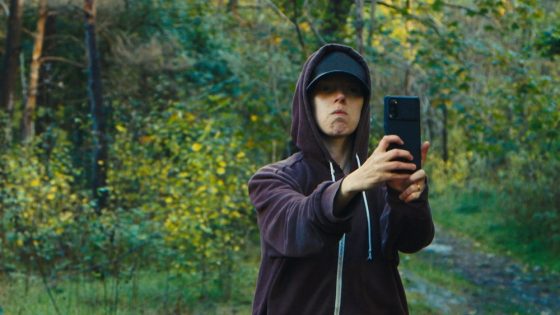A tense documentary that winds its way through online right-wing politics, Simon Klose‘s “Hacking Hate” is a detailed (if occasionally disconnected) exposé of contemporary extremism. It follows Swedish journalist My Vingren as she embeds herself within white supremacist digital spaces. By chronicling her investigations, as well as her interviews with several experts on content moderation, the film introduces numerous parallel threads spanning the entire globe, from the U.S. to Scandinavia and beyond, though it doesn’t always manage to weave them together.
Vingren is a committed and knowledgeable subject, referred to by some as the real-life “Girl with the Dragon Tattoo.” Her proclivity for tracing online footprints comes in handy during “Hacking Hate,” when she not only creates numerous fake profiles to court invites from white nationalist groups, but finds a trail of digital breadcrumbs where most would not think to look. In the process, she gradually uncovers the identity of a figurehead running a racist Norwegian chatroom hellbent on couching Islamophobia and antisemitism within the language of national pride.
Accompanied by Kate Havnevik’s propulsive, nerve-racking score, Klose captures this layer-by-layer unfurling with a keen eye, down to using real-life security camera footage that veers between chilling and absurd. The film’s aesthetic approach injects its story with a sense of paranoia, between a heightened, saturated color palette that nudges human faces into the realm of the unreal — as if to match Vingren’s deep-fake profiles, it always feels ever-so-slightly uncanny — and the recurring use of drone shots and voyeuristic long lenses. Each carefully staged scene is infused with the feeling of impromptu surveillance, as though the movie’s subjects were in danger.
Behind closed doors, Vingren’s investigations are presented in the form of projections on blank walls in darkened rooms, an eerie digital web that’s cast from the online world into our real one. In fact, Klose’s work is so visually appealing that it becomes illusory, introducing the sense that Vingren’s racism cosplay might have some unsettling psychological impact on her. This doesn’t seem to be the case as far as her behavior and reactions are concerned, but the question is posed for just long enough, through the movie’s artistry, that it continues to linger.
Beginning by observing “alt right” figureheads on YouTube, from Britain’s boyishly emphatic Paul Joseph Watson to Sweden’s off-putting bodybuilder/Hitler apologist The Golden One, “Hacking Hate” creates a digital framework for its real-world pursuit of knowledge. Unfortunately, when it leaves the proximity of online space and enters the real world, it becomes far more straightforward and less viscerally affecting — an unfortunate irony, given how much of its focus concerns the dangers of this spillage. Its sit-down interviews, with experts on platforms like Twitter and YouTube (conducted by Vingren herself), tend to take mundane and familiar form. These secondary subjects are usually presented as talking heads who express their concerns in words, but in ways the movie doesn’t complement or enhance through its images.
The theories the movie posits — including and especially that tech companies are profiting off extremism — work best when expressed in practice. These tend to be montages of the nauseating racist hatred that pollutes social media unencumbered, or simply, shots of Vingren slipping further down the white supremacist rabbit hole, as she uncovers the political and financial ties behind seemingly run-of-the-mill racist hate groups.
Vingren herself is a fascinating subject, even when (perhaps, especially when) she doesn’t speak, because her process is both intriguing and risky. On the other hand, when the movie pivots to Vingren interviewing other people, it begins to feel distant and removed, transforming into a documentary-by-proxy, about a subject telling stories about other subjects, which is far less enrapturing to watch. Her covert sleuthing is focused, but her Q&As with American interviewees, whose concerns are specific to the U.S. rather than her local sphere, tend to meander. That said, “Hacking Hate” has more than enough by way of audio-visual flourishes, while centering Vingren’s work, that it feels both meaningful and momentous.
Source Agencies

